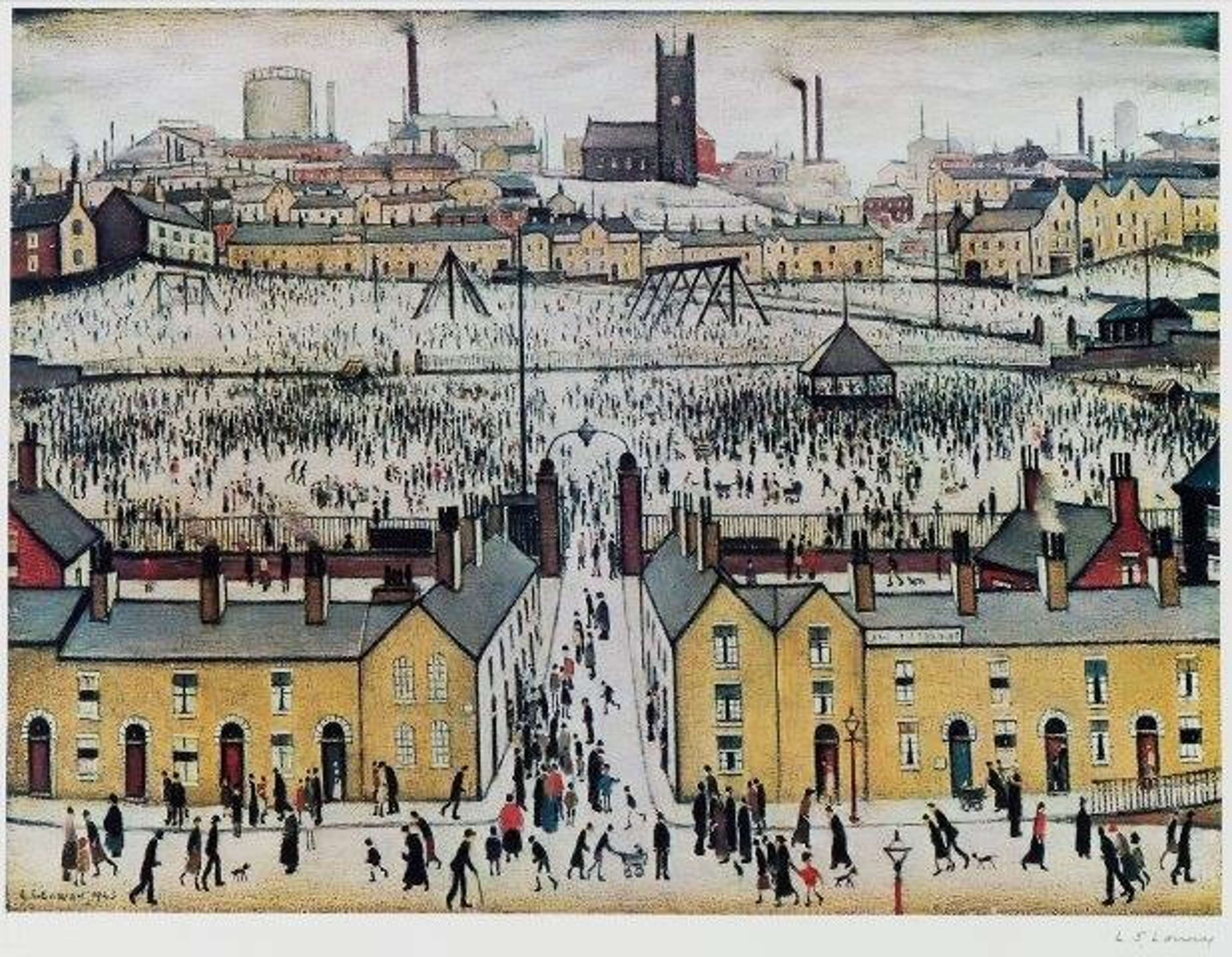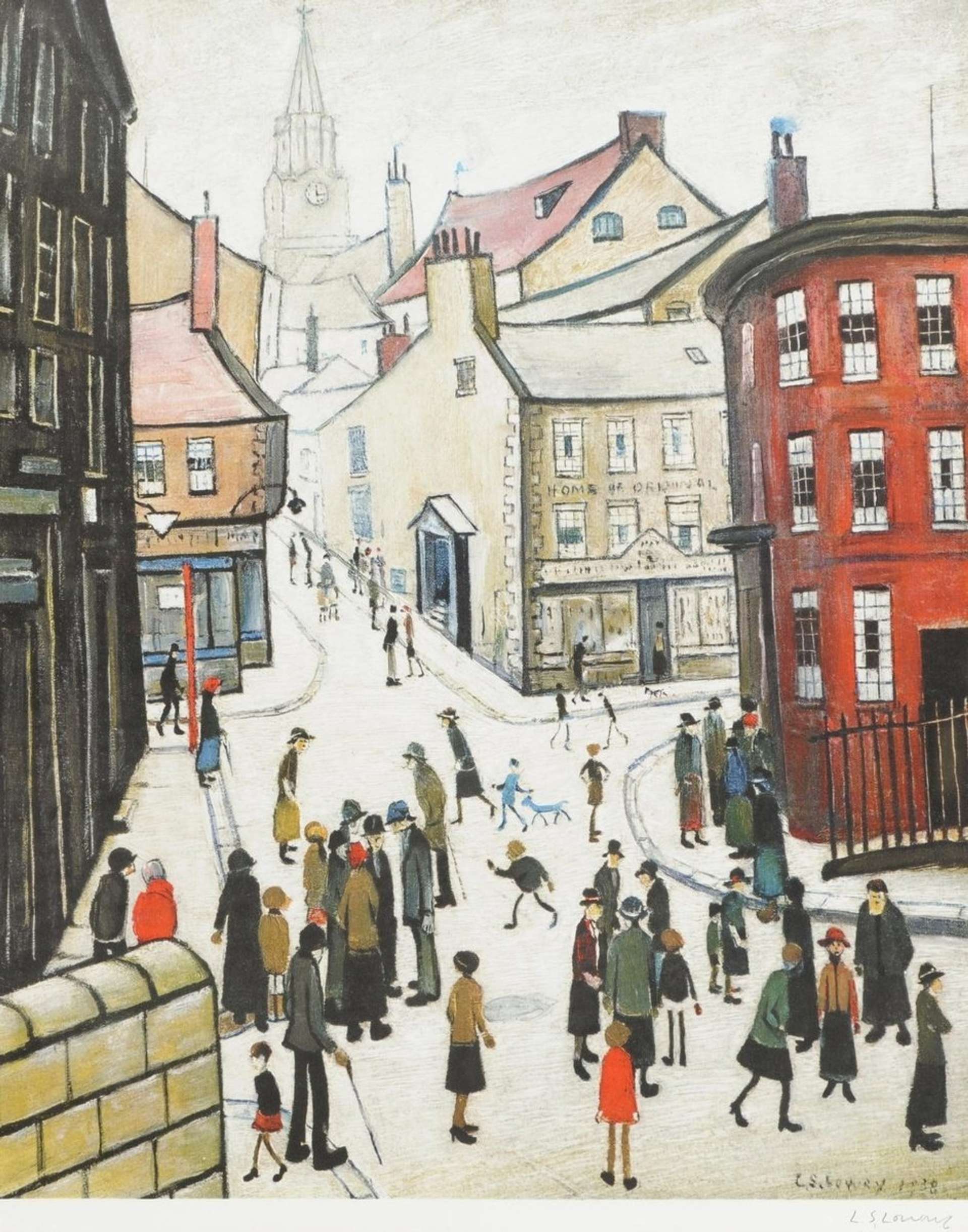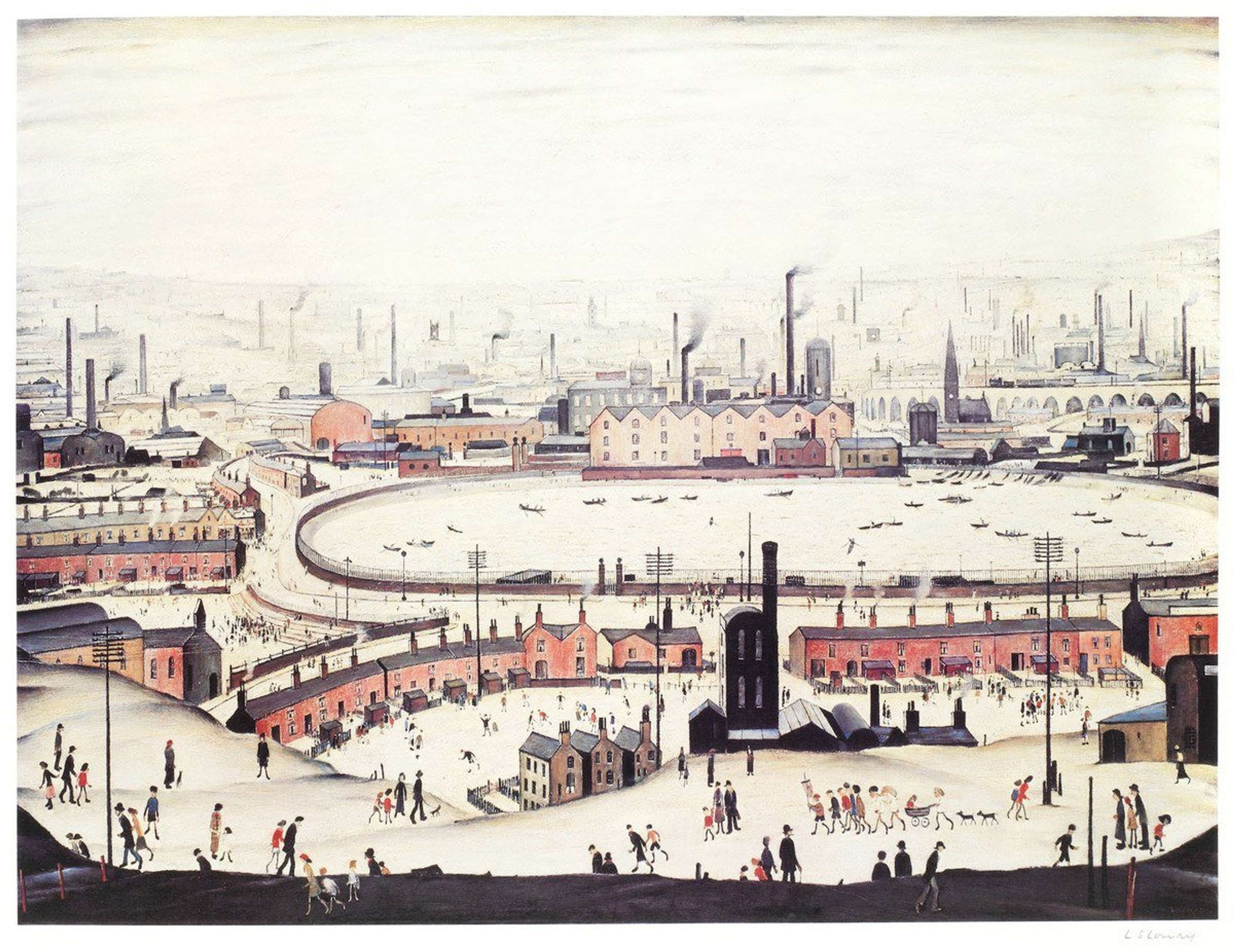 Britain At Play © L S Lowry 1943
Britain At Play © L S Lowry 1943
L S Lowry
73 works
Key Takeaways
The L.S. Lowry print market offers a unique opportunity for collectors and investors and remains highly sought-after in the art world. This buying guide explores the key aspects to acquiring Lowry prints, including authenticating artworks, understanding the significance of provenance, and navigating market trends. With a robust secondary market and increasing demand, Lowry’s prints have proven to be valuable assets for collectors. Explore the nuances of art valuation, auction results, and art investment strategies in this comprehensive guide to buying and collecting L. S. Lowry’s prints.
L. S. Lowry's unique depictions of industrial landscapes and working-class life have made him one of Britain's most celebrated artists. Whether you're a seasoned collector or new to his work, this comprehensive guide will provide valuable insights into the Lowry print market. From understanding his most iconic pieces to navigating the intricacies of authenticity and value, our expert guide offers everything you need to make informed decisions when buying a Lowry artwork.
Why Collect L S Lowry?
Lowry's unique style, characterised by his iconic 'matchstick men' set against industrial backdrops, is a hallmark of British art and remains highly coveted by collectors, particularly in the UK. Over the past decade, interest in Lowry's work has steadily increased, spurred by several high-profile exhibitions and media coverage. For example, Lowry's largest exhibition was the 2013 Tate Britain exhibition Lowry and the Painting of Modern Life was instrumental in solidifying his status as a leading blue chip artist, resulting in a significant rise in the value of his work on the secondary market. The 2019 release of the biopic Mrs Lowry & Son further rekindled public interest in Lowry’s life and art, highlighting complex personal relationships and challenges, but also emphasising his distinctive approach to portraying the everyday lives of working-class people.
Most recently, high-value Lowry paintings have been featured prominently in marquee auction sales. Going To The Match (1953) set a new auction record for a Lowry painting at Christie’s in 2023, selling for £7.8 million. This was followed by Sunday Afternoon (1957) which fetched £6.3 million in March 2024, underscoring the ongoing appreciation and cultural significance placed on Lowry’s work.
STARTING YOUR L S LOWRY PRINT COLLECTION
Although Lowry began painting in the late 1910s, most of his limited-edition prints were produced in the 1960s and 1970s, by which time he had gained recognition as an established artist. Some of these prints were reproductions of his most celebrated paintings, while others were created specifically as print editions. While he is renowned for his 'matchstick men' and scenes of Northern England and football matches, Lowry's print market is extensive, encompassing a range of subjects including portraits and landscapes, particularly of Northern seascapes, capturing the essence of the UK with a distinct and evocative style. For a comprehensive overview of the most sought-after Lowry prints, refer to our Lowry Seller's Guide.
Given the breadth of Lowry's print market, his works are prominently featured and available in major auction houses but the majority of his print market by sales value and lots sold lies in other auction houses outside the big three. This wide distribution makes his prints highly accessible to collectors, offering diverse opportunities to acquire pieces from his extensive oeuvre.
Is a Lowry print a good investment?
Lowry's print market has experienced significant growth over the past decade in terms of both sales value and the number of lots sold. There was a notable surge in 2021 across these metrics, followed by consistent year-on-year (YoY) increases and the average selling price (ASP) of individual Lowry prints has remained steady between £2,800 and £3,000. A significant appeal of Lowry's market is its accessibility, providing a wide price range and high volume for collectors looking to expand their portfolios or enter the blue chip print market. The growing demand for Lowry prints offers collectors the assurance of strong liquidity, making them not only a valuable addition but also a viable asset for future resale opportunities. For more insights into Lowry's print market, refer to our Lowry Investment Guide.
How much does an original Lowry print cost?
While some Lowry prints can fetch up to £40,000 at auction–his current print auction record is Going to the Match (1972), which sold for £43,520 at Bonhams in 2023–most prints are more accessible, with prices ranging from £500 to £2,500, £3,000 to £5,000, and up to £15,000. The value of a print is influenced by various factors, with condition and colouring being crucial, as well as the specific imagery depicted. In 2024, two Lowry prints surpassed the £20,000 mark, with the highest being Group of People (1968), which hammered at £29,000 at Adam Partridge Auctioneers in April. The monochrome print offered framed, shows a close-up of two Sunday school teachers interacting with children, and the result was particularly notable as it outperformed Going to the Match, which achieved £24,000 in June, indicating an evolving collector interest beyond Lowry's typical matchstick men at football games and northern town scenes.
Other noteworthy sales in 2024 included Berwick Upon Tweed (1973), an increasingly popular town print featuring Lowry’s signature colour palette, which sold for £8,200 in September. Additionally, there has been a growing interest in older lithographs with muted colour palettes, such as Francis Terrace, Salford (1969-72) and Tree in Square (1960), both of which hammered above £5,000, reflecting heightened collector interest in these works.
What are some of Lowry’s most popular prints?
Lowry’s print market is extensive, and historically, his most popular works have depicted industrial landscapes, sports, and fairgrounds. While these themes remain highly sought-after, as the value and volume of Lowry's market grow and collector interest expands, there is increasing demand for pieces from other phases of his artistic career. Below are some of Lowry's most sought-after prints that we are closely tracking in 2024.
- Man Lying on a Wall (1957): This work brims with intrigue and playfulness, filled with subtle ambiguities typical of Lowry. It depicts a solitary, well-dressed man reclining on a brick wall, as if pausing for a smoke break, his cigarette jutting out horizontally from his mouth and mirroring the smoke billowing from a nearby industrial building. As the viewer’s gaze shifts to the background, they notice Big Ben, revealing that the scene is not of the North but of London. Resting on the wall is an umbrella and a briefcase marked with Lowry's initials, hinting at a possible self-portrait. Created in the 1950s, one of Lowry’s earlier print works, this piece has garnered increasing collector interest, making several market appearances in 2024. Its record sale price to date is £10,625, achieved in 2021.
- A Village On A Hill: This piece is one of Lowry's early lithographs, produced in 1966. It is relatively rare on the market, having appeared only once in both 2024 and 2023. Depicting a tunnel landscape with a central path guiding the viewer into the distance, the work is a monochrome print signed by Lowry in red. It currently holds an average market value of around £4,000. The highest auction price for this piece was achieved in 2015, when it sold for £12,500 under the hammer.
- The Three Cats, Alstow: This monochrome print combines the appealing townscapes that collectors seek in Lowry’s work with a more intimate, close-up view of bustling town figures, a style gaining traction among collectors. It is a piece that has regularly featured at major auction houses, highlighting its value and rarity. This print hasn't been on the market since 2021, with its highest sale recorded in 2015 achieving a hammer price of £9,400.
How do you authenticate a Lowry print?
Authenticating a Lowry print involves several critical steps, beginning with verifying the signature, date, and publisher’s stamp. Typically, Lowry prints have a pencil signature in the margin below the printed image, although some may feature a printed signature. It's also important to look for the publisher’s blindstamp, as Lowry collaborated with different publishers throughout his career, and their stamp should be visible on the print. Additionally, edition numbers—generally between 75 and 850—are often marked in pencil and play a key role in establishing the print’s authenticity.
The Lowry, the official museum and archive dedicated to the artist, does not currently provide authentication services but instead focuses on education and exhibitions to preserve Lowry’s legacy. As there is no definitive catalogue raisonné for Lowry’s works, it’s essential to seek professional guidance if you're unsure about the authenticity of a print or need help verifying it. MyArtBroker’s experts specialise in Lowry’s market and can assist in confirming provenance and tracing the ownership history of his early prints. For more detailed information on Lowry’s signature and authentication methods, refer to our Lowry Seller’s Guide.
How to check the condition of a Lowry print
When assessing the condition of a Lowry print, it's essential to consider the vibrancy of its colours, as these are key indicators of value. Lowry's prints, typically created using a limited palette of flake white, ivory black, Prussian blue, yellow ochre, and vermilion red, should maintain these distinct hues. Fading, particularly in older prints, may indicate poor-quality ink or overexposure to sunlight. Pay close attention to the signature–if it's faded, this can affect the artwork's value. If you’re uncertain about the print’s condition or need professional advice, seeking expert assistance is recommended. For additional support, including finding restorers and condition specialists, refer to The Directory, which provides valueable resources for all of your buying and selling needs.
Where can I buy a L S Lowry print in 2024?
There are several options for acquiring a Lowry print, such as through auction houses, independent dealers, or online platforms like MyArtBroker. Given the prevalence of forgeries in Lowry’s market, it’s crucial to purchase from reputable sources. While galleries and auction houses provide credibility, their premiums can often exceed 25%.
Although online purchases offer convenience, it's best to avoid platforms like eBay due to the heightened risk of counterfeits and scams. MyArtBroker offers a streamlined approach, connecting you with a global network of trusted buyers and sellers through our online Trading Floor. Contact us today for a free consultation with one of our specialists. For more information on different sales methods, see our Guide to Auction versus Private Sale.
Looking To Acquire Lowry Prints?
Browse L. S. Lowry on the Trading Floor and sign up to MyPortfolio Collection Management.
Why use MyArtBroker to find your first L S Lowry?
A Dedicated Expert
MyArtBroker offers a trusted platform where you can connect directly with an expert broker. Your dedicated specialists will work with you to find the desired Lowry piece at a price that suits your budget. Our experts will verify the condition and authenticity of the artwork, and even help arrange delivery. We combine the trust and assurance of working with a specialist with the convenience, transparency, and efficiency of an online process.
Our Network
Our global network includes over 30,000 collectors actively buying and selling works daily, along with dealers, galleries, and independent experts who collaborate with us to offer the most sought-after and genuine Lowry pieces. With 75,000 visitors to our website each month, we provide regular updates on the artist’s market performance, auction results, and new works, as well as informative essays and a comprehensive biography of Lowry.
MyArtBroker has access to a worldwide network of art collectors selling Lowry artworks. If you’re interested in purchasing a Lowry print, get in touch with us, and we’ll guide you through the process.












